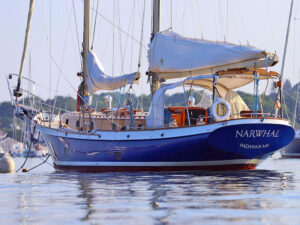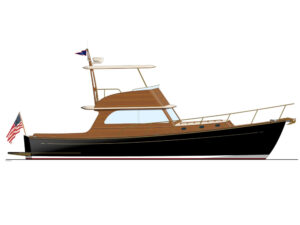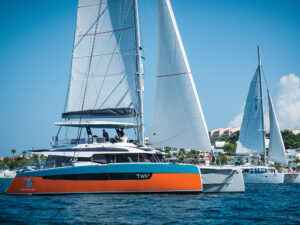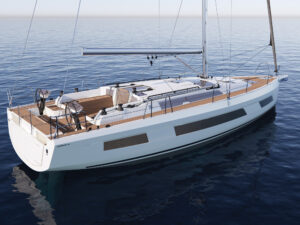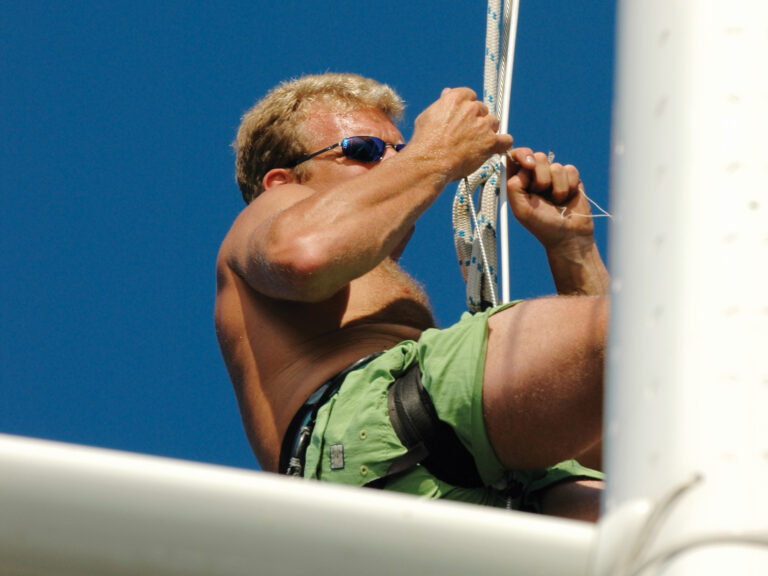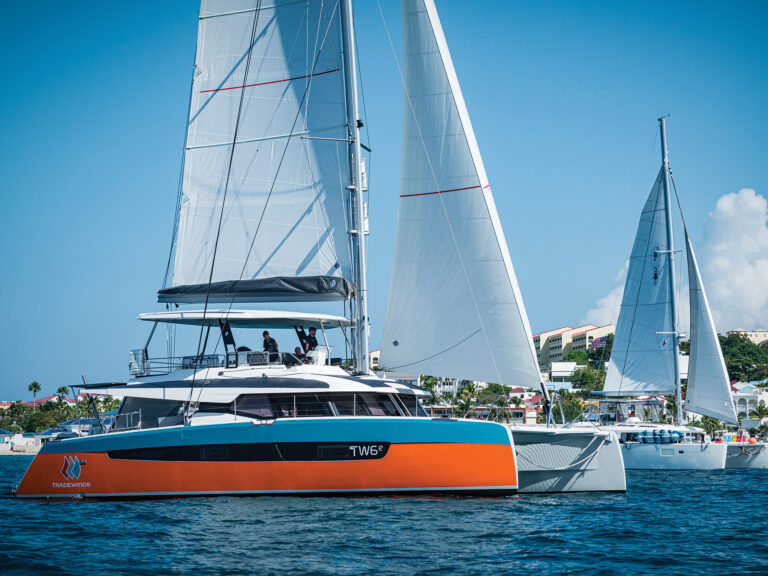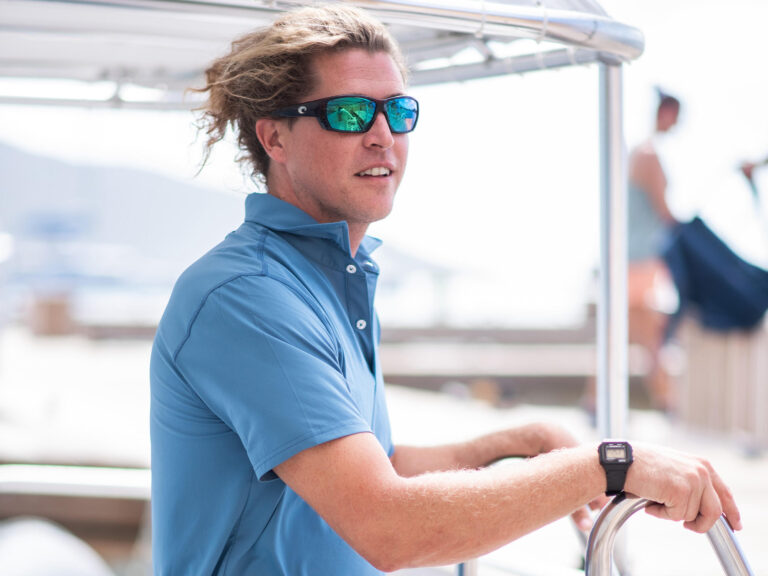
I knew I was in for an entertaining evening when Charlie Macaulay greeted me in the cockpit of Absolutely, his well-sailed Farr 39 — sporting boardshorts; several strings of Mardi Gras beads, including some that he personally collected in 1979; an Australian bush hat (think Crocodile Dundee, sans the ornamental incisors); and a broad smile — for my first-ever Duck Dodge. While I’ve lived and sailed in Seattle for almost a decade, I’d previously missed my opportunities to experience the nautical free-for-all that plays out each Tuesday evening in the summertime on Lake Union, below the lofty summit of nearby Mount Rainier and the airy pinnacle of Seattle’s Space Needle. Fortunately, my wait was rewarded with bluebird skies and 10 knots of northerly breeze.
Duck Dodge began in 1974 as way to generate midweek fun. But unlike traditional regattas — where an encyclopedic knowledge of the rules, fresh sails, and a dialed-in crew are prerequisites — Duck Dodge has 12 simple rules, five of which pertain to avoiding contact with other vessels. Rule Six states that “bribing the committee is against the rules (while anyone is looking);” and Rule 12 stipulates that racers shall “never make a duck change its course (Dodge the Duck).” Also important, Rule Eight states, “There is no rule number eight.”
Read between the duck-dodging lines, and it’s obvious that (almost) anything goes, so long as contact between vessels — and ducks — is avoided. In fact, the first Duck Dodge poster (circa 1974) specifically states that a skipper can bring “any sailboat, any size, any crew,” and “any sail (or facsimile) you can fly.” The poster’s “Sacred Duck Rule” stipulates that any vessel “coming in contact with or substantially frightening” a duck must complete a 720-degree penalty turn and apologize to the fowl before resuming racing. “We actually had an incident earlier this year where we had to avoid the ducks,” said Macaulay, who has been a regular Duck Dodger since 1983. “There were a couple of ducks right near the starting line, and we did our part and stayed away from them.”
I took stock of the scene as we motored the short distance from Absolutely’s slip to the racecourse. While there were some thoroughbreds — including Absolutely; Hamachi, a J/125; and Double Take, a J/145 — most of the fleet (around 150 vessels, including Lasers, Thunderbirds and Penguins) was comprised of aging fiberglass beauties with white sails and casual crews. Some sailors were costumed, others wore Mardi Gras beads, and virtually everyone was enjoying a pre-start libation. There were no ducks in sight, but as we hoisted sail, it quickly became apparent why five out of the event’s 12 rules pertained to collision avoidance. “It’s a balance between dodge ’ems and boat racing,” said Doug Hansen, Absolutely’s mainsail trimmer. “The golden rule is to avoid contact at all cost, and for the most part, people do a good job of putting safety before performance.”
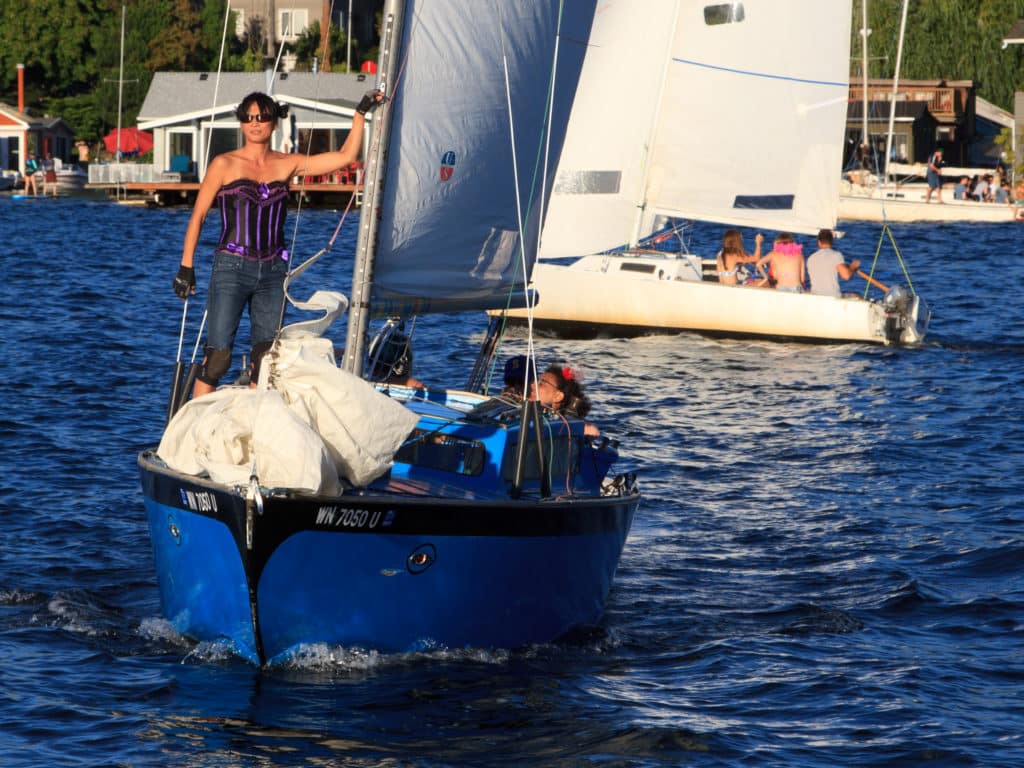
The race committee posted the course (a triangle, twice around) and began the countdown sequence as boats clustered. While I didn’t see anyone testing the line’s favored side — de rigueur at any other regatta — I did hear a few stressed-out skippers exhibiting their auditory abilities. Fortunately, Macaulay exemplifies the sotto-voce style. “Some people take it too seriously,” he said. “The whole point is that it’s not serious. We try to be good sports about it and not mess with anyone else, but it’s boat for boat, and there are no handicaps, so some people take the competition a little too far.”
Macaulay expertly ducked a few boats, and we quickly left the starting line astern. Absolutely’s regulars rifled through a series of tacks as we fought to gain clear air. The first spinnaker set came next, but instead of aiming for the best pressure, Macaulay opted for a clear lane that would create the least headaches for our crew or any of the myriad teams that were packed along Lake Union’s western shores. Absent were the usually ubiquitous calls for room as we approached the leeward mark; instead, I heard only lighthearted jokes ricocheting off rigs. “Between costumes, blasting music and water-balloon fights, it’s the people who make Duck Dodge what it is,” said Hansen.
The next lap unfurled much like our first: Absolutely and the other quick boats made big gains, only to lose swaths of boats to mandatory tacks that were triggered by wind shifts or lack of physical runway (Lake Union is only 580 acres). Yet no one seemed to care. In fact, the only time I heard any real concern in anyone’s voice aboard Absolutely was right before a key tack when Sheila Macaulay — Charlie’s daughter, Doug’s girlfriend, and the crew’s highly capable boss — couldn’t find a safe spot to stash her still-full can of Rainier Beer as she rushed to blow a runner. I grabbed the can, my only real contribution to the night’s effort, just in time.
We crossed the finish line as the sun was painting the western sky in reds and oranges above the distant Olympic Mountains, but no one bothered checking our results. “The regulars raft up and stay here until well after dark,” Macauley told me. “There are traditions involved: The virgins have to go and kiss the skipper and the mast of every boat in the raft-up.” Nautical pageantry aside, the raft-up has attained legendary status in multiple Seattle social circles. “It is one of the best parties in the city,” said Hansen. “It’s hundreds of people going every which way, giving kisses to strangers and making new friends at every turn. Without the party, Duck Dodge would be just another boat race.”
While family duties called me and several other scalawags ashore, the rest of the Absolutely crew looked ready to enjoy the fine August evening’s fleeting light with their friends and fellow competitors, no doubt reveling in the camaraderie of one of the country’s most unique sailing events.
And as for Rule Six, well, what happens at Duck Dodge, stays at Duck Dodge.
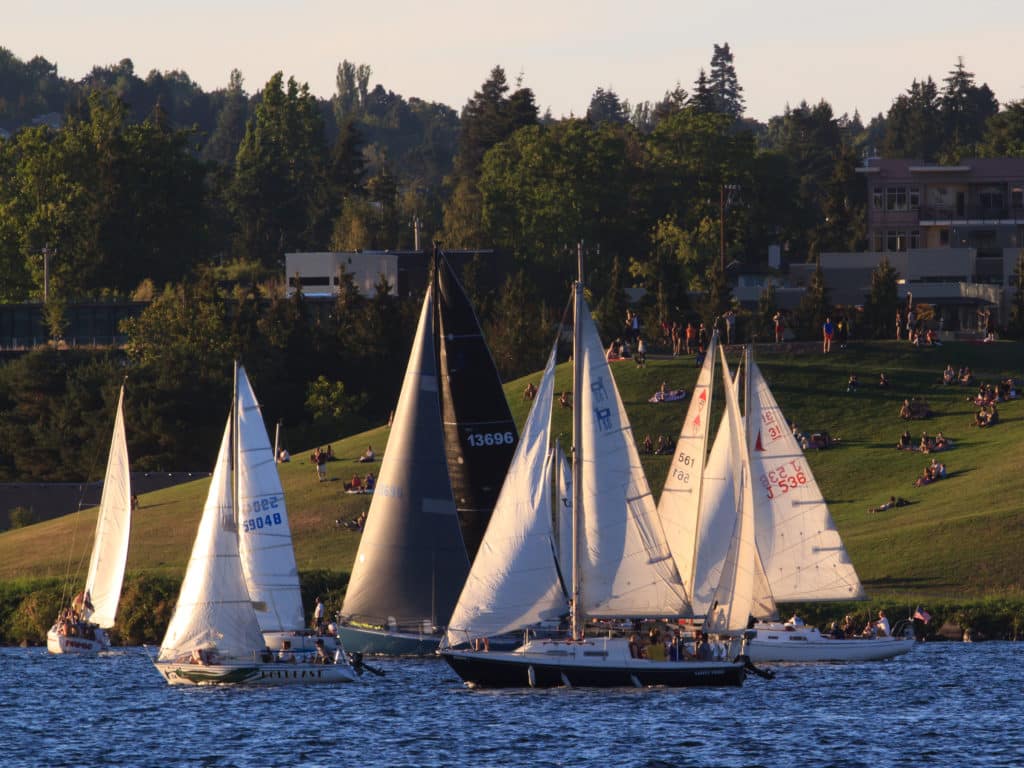
How to Dodge the Ducks
As with many sailing events, owning your own boat guarantees your participation. Fortunately, Duck Dodges are open to literally any type of sailboat (Lasers or Optimists are welcome), and the registration process involves simply sailing past the race-committee boat and announcing your vessel’s name and sail number (and making sure they acknowledge receipt of this information), so the bar is set low. For interested sailors who lack a boat, Duck Dodges are essentially great excuses to get out on the water with friends and family, so most skippers aren’t worried about carrying an extra body or two, especially if you arrive with libations and a can-do spirit. Duck Dodge season typically starts in early May and runs every Tuesday evening through early September, so there are plenty of opportunities to experience this Seattle-only event.
David Schmidt is CW’s electronics editor.

